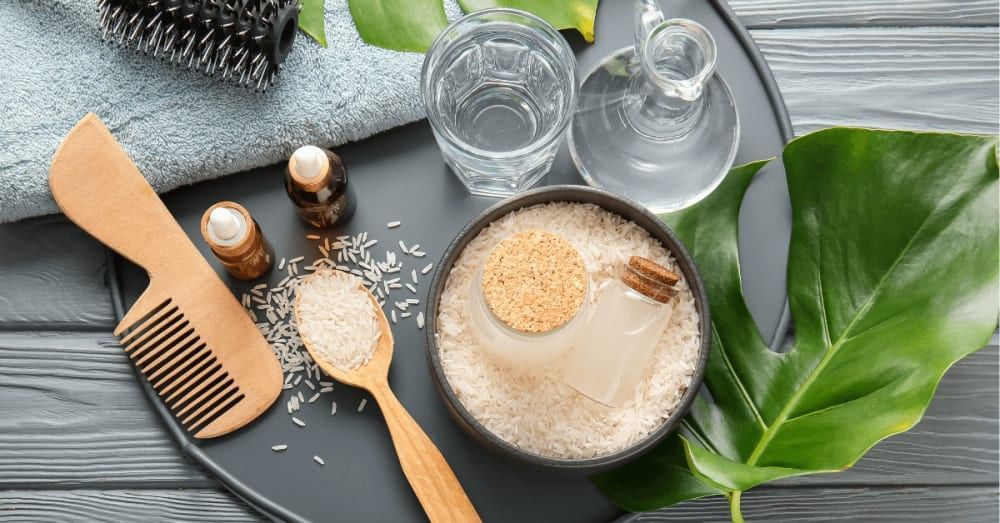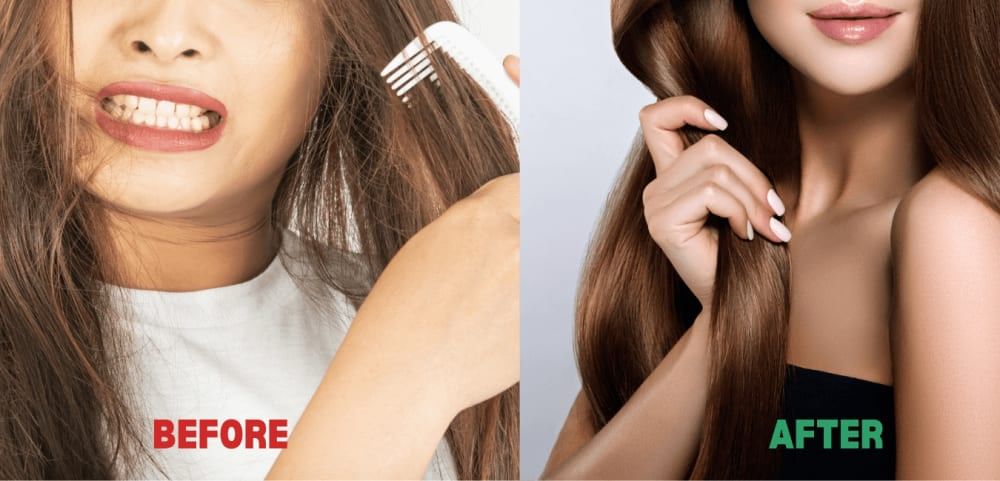Rice Water for Hair Benefits, 2x Hair Growth, Side Effects, Recipes, More
Studies in the past have suggested that rice water may reduce surface friction and enhance hair elasticity. However, these studies draw from historical evidence, and their results remain largely unsupported.

Rice Water for Hair: History
Rice water is an excellent remedy for hair. It is nothing new, in case you were wondering. The Yao women of China have popularized this technique over the centuries. Southeast Asian cultures have been responsible for this remedy reaching worldwide promise. But does it really work?
Yes! Even though there is not too much scientific evidence supporting claims of rice water as excellent for hair, there is enough anecdotal evidence to support this. Moreover, the amino acids present in rice water aid hair growth and regeneration. It also contains Vitamin E, C, and B - all essential for hair growth and health.
Scientific Studies on Rice Water for Hair
Examples of the Yao women border on tradition. But what does science say? Studies in the past have suggested that rice water may reduce surface friction and enhance hair elasticity. However, these studies draw from historical evidence, and their results remain largely unsupported.
To date, research regarding rice water benefits for hair depend upon anecdotal evidence.

Rice Water Benefits
There are several benefits of boiled rice water for hair & skin, the digestive system, and your clothes. Most claims have been proven via studies, while some still lack hard evidence to prove their reliability.
- Rice water, or Oryza Sativa, can lessen inflammation and skin irritation caused by sodium lauryl sulfate(SLS), a compound found in personal care products.
- The use of rice water for hair also increases the shine of hair and strengthens the hair roots.
- As per a study, rinsing your face with fermented rice water helps with sun damage and prevents visible effects of ageing such as wrinkles due to its antioxidant properties.
- Drinking rice water can be a remedy for food poisoning and stomach bugs. A study suggests rice water consumption is an effective remedy for patients with diarrhoea. It hydrates the body with sufficient amounts of water.
- It is also a good stiffener for clothes. Just dip washed clothes in rice water and dry them in the sun to make them stiff.
Rice Water Benefits For Hair
A good number of studies supports the claim that rice water is good for hair, and their presence as ingredients in hair care products suggest the same. Discussed below are some benefits of rice water for hair fall issues
#1 Improves Hair Strength
Long hair requires nutrients to nourish scalp health and improve hair thickness. Rice water contains starch, which performs this role by coating hair strands with proteins. It reduces hair surface friction caused by rubbing during combing, styling, and washing and increases hair elasticity and smoothness. Furthermore, it also improves hair strength by decreasing the dryness of hair.
#2 Nourishes Hair Scalp
Using boiled rice water for hair helps improve hair root strength by nourishing the scalp. Rice water consists of several macro and micronutrients, such as vitamins, carbohydrates, and minerals, which improve scalp health.
Also read: 7 best natural home hair spa solutions
#3 Encourages Hair Growth
The use of rice water for hair benefits the scalp by repairing the damage. Antioxidants present in rice water nourish hair follicles. Furthermore, vitamins B, C, and E help maintain a suitable environment for hair growth.
#4 Increases Hair Shine
Rice water is a natural conditioner that makes hair bouncy. It adds a layer of protection, especially against air pollution, electric hair appliances, chemicals in hair care products, etc.

#5 Eliminates Dandruff and Flakes
Fermented rice water, mainly made from red rice, inhibits the growth of Malassezia, a fungus that causes dandruff. According to a study, one-day-old rice water has the bacterium Bacillus cereus, which produces antibiotics zwittermicin A and kanosamine. These prevent Malassezia growth.
#6 A Chemical-Free Hair Cleanser
You can use rice water as a conditioner, hair mask, or shampoo. The multiple benefits of rice water allow you to make any hair product with it.
Also Read: Hair Botox 101: Treatment, Cost, Benefits, Side Effects, More
Rice Water Benefits for Hair Growth
Rice water is enriched with different minerals and vitamins. These nutrients yield several benefits that can help strengthen your hair. Here’s a list of some benefits of rice water for hair growth:
- Rice water works as an effective conditioner. It enriches the texture of your hair and adds elasticity and volume.
- Rice water tames frizziness and makes hair smoother. It’s ideal for people with dry hair.
- Rice water helps reduce hair fall.
- Women who have damaged hair should use rice water to prevent further damage.
- Research suggests that the antifungal properties in rice water combat dandruff.
- Rice water can help you improve the quality of your hair by making it more shiny and silky.
- Rice water promotes a healthy scalp environment. This, in turn, boosts overall hair health.
- Rice water helps detangle hair and hence prevents hair fall.
- Applying fermented rice water for hair growth is a natural remedy. That’s why it’s entirely safe and can be used twice a week without worrying about side effects.

How to Make Rice Water for Hair
There are just two ingredients in rice water, and you can make it in minutes.
Here's a simple guide on how to make rice water for hair:
Ingredients
- 1 cup rice
- 1 cup filtered water
Directions
- Rinse the rice and clean it adequately. You may need to rinse and strain the rice a second or third time if you use non-organic rice, as pesticides are likely to remain.
- Leave the strained rice at room temperature for 12 hours to allow the water to ferment, and then refrigerate it.
- Mix the strained rice with the water until the water becomes cloudy, then strain the rice, reserving the water.
How to Use Rice Water for Hair
Make sure you store rice water in an air-tight container to take full advantage of its benefits. There are a few tips on how to use rice water on your hair:
- After shampooing and conditioning your hair, use rice water as a rinse to achieve a glossy finish.
- You can use aloe vera and a few drops of your favourite essential oils with rice water as a hair mask to get additional benefits.
- Many individuals spray rice water on their hair as a leave-in conditioner as part of their daily hair routine. Do what works for you!
Rice Water Uses for Hair Growth
Here are a few ways that you can use rice water for hair growth:
Soaking rice water for hair growth
- The prep time for this method is 30 - 40 minutes.
- Take half a cup of raw white rice and rinse it thoroughly.
- Place the washed rice into a bowl and soak it in two to three cups of water.
- Cover the bowl and stir the rice once after 15 minutes. The water will soon become cloudy, indicating that the minerals and vitamins of the rice have seeped into the water.
- Leave the rice to soak for another 30 minutes.
- Strain the water into a clean container.
- Use this strained rice water two to three times a week after washing your hair.
Fermented rice water for hair growth
- The prep time for this method is one to two days.
- Take a cup of rice and rinse it under tap water.
- Put the washed rice in a clean container and pour around two to three cups of water into it.
- Leave the rice for about 30 minutes, and then stir the rice until the water becomes cloudy.
- Strain the water into an airtight jar. Let this rest at room temperature for 24-48 hours. This will allow the water to ferment.
- The resulting water will become opaque and will have a sour smell.
- Strain the rice water and store it in a refrigerator for later use.
- To get the desired results, use this fermented rice water twice a week after washing your hair. Massage the rice water into your scalp gently for 20 minutes, and then wash it with warm water.

Boiling rice water for hair growth
- The prep time for this method is 60-80 minutes.
- Take half a cup of raw rice and put it into a saucepan.
- Cover the rice with double the amount of water than what is required for cooking it.
- Boil the rice until the water becomes cloudy.
- Let the water cool down. Strain the rice water into a clean container and store it for later use.
- Use this boiled rice water for hair growth after washing your hair with shampoo. You can wash your hair with rice water twice a week.
Also Read: Redensyl For Hair | Benefits, Products and Side Effects
Rice Water for Hair Fall
Rice water contains essential amino acids that strengthen the hair and reduce hair fall. Fermented rice water restores the pH levels of the scalp and adds elasticity to the hair.
Does Rice Water for Hair Fall Really Work?
- Rice water contains amino acids that promote hair growth.
- Rice water provides hair follicles with vitamin E and vitamin B. This enables a healthy scalp which subsequently helps with hair growth.
- The antioxidants present in rice water nourish the scalp and repair damaged cells.
- Starch present in rice water coats your hair strands and makes them strong.
How to Use Rice Water for Hair Fall
#1 Rice Water Rinse
- Shampoo and condition your hair.
- Take one cup of fermented rice water and add one cup of regular water to it.
- Pour it over your hair and massage the water in your scalp.
- Keep it on for about five to ten minutes.
- Rinse your hair with warm water.
#2 Rice Water Leave-in Conditioner
- Wash your hair with shampoo.
- Pour your rice water into a spray bottle and spray your hair with it.
- Leave the rice water in your hair and use it as a leave-in conditioner.
#3 Rice Water Hair Mask
- Wash your hair with a mild cleanser.
- Apply rice water all over your hair. Massage the water thoroughly into your scalp.
- Cover your hair with a shower cap and leave it on for 15 to 20 minutes.
- Wash your hair with plain water.
Yao Women Rice Water Recipe
Who Are Yao Women?
The women of Halguon, a remote region in China, are known as Yao Women. They are said to have hair that is over 2 metres in length. They credit the length to the use of rice water. However, the method of preparation of Yao rice water isn't an easy one.
How Do Yao Women Use Rice Water For Hair?
As per Yao women, the time-consuming process of making rice water requires boiling rice submerged in water inside a big clay pot on an open fire. This water is then used to wash hair at least twice a week. Several additional ingredients are added to it, such as citrus peels, pomelo peels, ginger, and fleece flower root. The water is then separated and kept aside for fermentation. It can take over a few days to a few months for the fermentation process to be completed.

Boiled Rice Water for Hair
How does it work? Boiled rice water provides nourishment to the hair scalp by strengthening hair follicles.
Why does it help? The presence of amino acids and inositol in rice water strengthens roots and increases hair volume.
Best Practices: Massage rice water on shampooed hair, and leave for about 5-20 minutes. Rinse it off with water.
Boiled Rice Water vs Fermented Rice Water for Hair
Boiled rice water has a PH of 5, which is too high to be used on the scalp. On the other hand, fermented rice water has lower PH levels. It closes cuticles and prevents hair damage.
Furthermore, the process of fermentation increases nutrient levels in plain rice water. This promotes healthy hair growth. Properly fermented rice water nourishes hair follicles and improves hair health more than cooked rice water for hair does.
Also, a substance called 'pitera', which results from fermentation, improves hair cell regeneration.
Fermented Rice Water for Hair
According to a recent study, fermented substances have a higher amount of antioxidants known to fight skin and hair cell damage. Fermented rice water is said to work wonders for hair length, breakage and softness.
How to Make Fermented Rice Water for Hair?
- Measure half a cup of uncooked rice
- Rinse it thoroughly and then add 2-3 cups of water
- Make sure you leave it to soak for about two days, letting it ferment
- Strain the water into a clean bowl and apply it onto your hair with the help of a spray or just by pouring it over
- Massage your scalp for about 3-5 minutes
- You can leave fermented rice water in your hair for up to 12 hours and then wash it off with a mild shampoo.
Rice Starch For Hair
Rice starch is known to improve hair growth and keeps it shiny and smooth. It is rich in amino acids, which strengthens hair roots. Rice starch also contains inositol, a carbohydrate that repairs and protects damaged hair.
Side Effects of Rice Water on Hair
Rice water, as nutrient-rich as it is, may damage your hair because of the amount of protein it absorbs. Here are some possible side effects of rice water:
- It may result in frizzy and brittle hair.
- It leaves a pungent, foul smell behind.
- Moisture and nutrients cannot pass through your hair because of the protein coating.
- When too many essential oils are added to the rice water mixture, the nutrients in other ingredients may not get absorbed into your hair follicles.
Rice Water for Hair Before and After

Rice Water for Hair Growth Results 1 Week: Myth or Truth?
There are studies and anecdotal evidence by women that proves the benefits of Kanjivellam for hair growth.
However, hair growth via rice water is a slow process that requires patience. Rice water solely cannot add inches to your hair in just one week. Your genes inherently decide the growth rate of your hair. However, over time, rice water can provide a boost to your hair growth if used consistently.
Research has found that rice water contains Inositol, a compound that can penetrate damaged hair and repair it from the inside out. Moreover, studies have suggested that rice water contains Vitamins E, B and several other minerals and antioxidants. All of these nutrients help make hair follicles strong and healthy, according to research. This promotes hair growth and improves overall hair health.
Women often have split ends that prevent hair strands from growing. Rice water helps seal those split ends and helps with healthy hair growth. Rice water reduces hair friction and promotes hair elasticity, thus, further preventing breakage and hair fall.
You might not observe the hair growth results of rice water within a week. However, your hair will feel healthier and fuller, indicating good scalp health.
Does Rice Water Help with 2x Hair Growth? Is it Nature's Miracle Potion?
Yes! Even though rice water does not have scientific evidence backing it, when used correctly, it can be an absolute miracle worker for dry, brittle and unmanageable hair. Make sure to give it a try! However, also remember that if you have a genetic condition, a remedy will not help you. Every woman's hair concerns and hair cycle is unique. Make sure to consult your doctor before trying anything new because your hair is not an experiment.
Also read: Amla for hair
Conclusion
Several countries have used rice water as a hair treatment for generations, and it is still used frequently today. There are great benefits of applying rice water to hair. With soaked or cooked rice water for hair, a starchy liquid is produced by the rice grains with a starch content of 75 to 80 per cent. Rice water contains many vitamins and minerals in rice, including amino acids, B vitamins, vitamin E, minerals, and antioxidants.
FAQs
1) Can We Apply Rice Water on Oily Hair?
Yes, you can apply rice water on oily hair. Before applying fermented rice water to your hair, you can add a few drops of essential oils that are beneficial to your hair. Let the rice water for hair soak through for five to seven minutes, then rinse it out.
2) How Often Can I Use Rice Water on My Hair?
If too much rice water is used very frequently or left in the hair for too long, it can cause damage. Use rice water not more than once a week, and do not use it as a leave-in spray if it’s not suiting your hair.
3) Should I Shampoo After Rice Water?
You can use rice water after shampooing and rinse your hair thoroughly with warm water afterwards.
4) Can You Sleep With Rice Water in Your Hair Overnight?
Yes, rice water can be used as an overnight hair mask. However, please do not leave it on for more than 18 hours as there is a chance that bacteria can grow in rice water, which will result in itching and flaking of the scalp.
References
S. Inamasu, R. Ikuyama (2010) Abstracts: The effect of rinse water obtained from the washing of rice (YU-SU-RU) as a hair treatment (International Journal of Cosmetic Science) https://onlinelibrary.wiley.com/doi/abs/10.1111/j.1468-2494.2010.00605_3.x
Dase Hunaefi, N. Akumo (2012) The Effect of Lactobacillus plantarum ATCC 8014 and Lactobacillus acidophilus NCFM Fermentation on Antioxidant Properties of Selected in Vitro Sprout Culture of Orthosiphon aristatus (Java Tea) as a Model Study (MDPI) https://www.mdpi.com/2076-3921/1/1/4/htm
Saneesh Kumar (2013) Analysis on the Natural Remedies to Cure Dandruff/Skin Disease-causing Fungus - Malassezia furfur (Advanced Biotech) https://www.researchgate.net/profile/Saneesh-Kumar-2/publication/261071142_Analysis_on_the_Natural_Remedies_to_Cure_DandruffSkin_Disease-causing_Fungus_-_Malassezia_furfur/links/00b7d5332a4ed64d4f000000/Analysis-on-the-Natural-Remedies-to-Cure-Dandruff-Skin-Disease-causing-Fungus-Malassezia-furfur.pdf
Ivana Binic, Viktor Lazarevic (2013) Skin Ageing: Natural Weapons and Strategies (U.S. National Library of Medicine) https://www.ncbi.nlm.nih.gov/pmc/articles/PMC3569896/
Deepak KumarVerma, Prem Prakash Srivastav (2017) Proximate Composition, Mineral Content and Fatty Acids Analyses of Aromatic and Non-Aromatic Indian Rice (Science Direct) https://www.sciencedirect.com/science/article/pii/S1672630816300713
Lim Ai Beoy, Wong Jia Woei (2010) Effects of Tocotrienol Supplementation on Hair Growth in Human Volunteers (Tropical Life Sciences Research) https://www.ncbi.nlm.nih.gov/pmc/articles/PMC3819075/
Eric W Leppink, Sarah A Redden (2017) A double-blind, placebo-controlled study of Inositol in trichotillomania (National Library of Medicine) https://pubmed.ncbi.nlm.nih.gov/27824633/
S. Inamasu, R. Ikuyama (2010) Abstracts: The effect of rinse water obtained from the washing of rice (YU-SU-RU) as a hair treatment (International Journal of Cosmetic Science) https://onlinelibrary.wiley.com/doi/abs/10.1111/j.1468-2494.2010.00605_3.x
Evelyn Saba, Chun Hee Lee (2016) Fermented rice bran prevents atopic dermatitis in DNCB-treated NC/Nga mice (National Library of Medicine) https://pubmed.ncbi.nlm.nih.gov/27323667/

